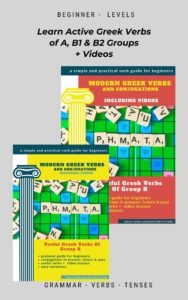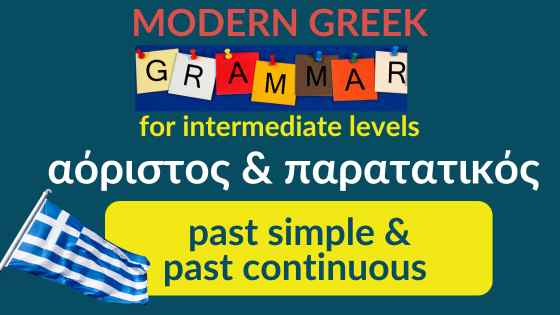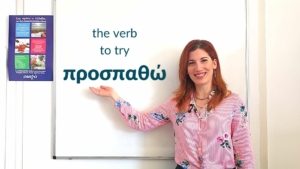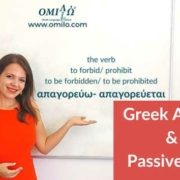Are you at an intermediate language level in Greek, and getting confused when to use which tense?
Learning Greek verbs and tenses is necessary to start communicating in Greek.
When you reach the intermediate level, you will be ready to learn the past tenses;
Most students, will learn the Αόριστος first, and then the Παρατατικός , or Simple Past and Past Continuous.
In this blog article, we will explain the Αόριστος and Παρατατικός tenses, their conjugations, and the difference in how to use these two tenses.
It is not always easy for non-Greeks to understand when to use which tense, so we will try to make it more clear for you, with many examples and exercises.
Some useful grammar to get started
When you conjugate a verb, you first need to know to which category the verb belongs.
This is also the case for present or future tenses, and something you learn from the very beginning.
If you are not sure what this means, then take a look at following eBooks, to repeat some essential grammar, before you start learning past tenses
 Click here for for an eBook about
Click here for for an eBook about
Verbs and conjugations belonging to Category A- verbs (this is the biggest category)
For example, verbs as Κάνω, δουλεύω, έχω, μένω…
 Click here for for an eBook about
Click here for for an eBook about
Verbs and conjugations belonging to Category B1 and B2- verbs
For example, B1 verbs μιλάω, πινάω…
B2 verbs; μπορώ, οδηγώ…
++++++++++++++++++++++++++++++++++++++++++++++++++++++++++++++++++
1. The αόριστος – Simple past tense – conjugations
The Aoristos is an ideal tense to describe an action that happens at a particular point in the past.
It gives no information on how long it took, but is used for an action that happened just once in the past,
—-> so NOT an action that was repeated often.
Ρήματα Α | Verbs of Category A
When you conjugate Verbs of Category A in “aoristos”, you need to change the last letter of the stem, as follows
ν, -θ, -ζ —> σ (πληρώνω – πλήρωσα) to pay
-κ, -γ, -χ, -χν, -γγ, -σκ —> ξ (ανοίγω – άνοιξα) to open
-π, -β, -φ, -πτ —> ψ (γράφω – έγραψα) to write
-αυ, -ευ —> αψ, εψ (δουλεύω – δούλεψα) to work
Take a look at an example ;
(we use the verb “πληρώνω» as an example, which means “I pay”)
Εγώ πλήρωσα I paid
Εσύ πλήρωσες you paid
Αυτός,ή,ό πλήρωσε he/she/it paid
Εμείς πληρώσαμε we paid
Εσείς πληρώσατε you paid
Αυτοί,ές,ά πληρώσανε OR πλήρωσαν they paid
NOTE: The accent must be always on the third last syllable.
When there is no 3rd syllable, then you add one, —> add –ε
example; γράφω (I write) – –> έγραψα (I wrote)
Ρήματα Β1 | Verbs Category B1
When you conjugate Verbs of Category B1 in “aoristos”,
you take the stem and you add; –ησα, –ησες, –ησε, –ήσαμε, –ήσατε, –ήσανε/-ήσαν
Take a look at the conjugation ;
(we use the verb “μιλάω” as an example, which means “I speak/ I talk”)
Εγώ μίλησα I talked
Εσύ μίλησες you talked
Αυτός,ή,ό μίλησε he/she/it talked
Εμείς μιλήσαμε we talked
Εσείς μιλήσατε you talked
Αυτοί,ές,ά μιλήσανε OR μίλησαν they talked
Ρήματα Β2 | Verbs Category B2
When you conjugate Verbs of Category B2 in “aoristos”, you follow the same rules with B1 verbs.
You take the stem and you add –ησα, –ησες, –ησε, –ήσαμε, –ήσατε, –ήσανε/-ήσαν
Take a look at the conjugation ;
(we use the verb “οδηγώ” as an example, which means “I drive”)
Εγώ οδήγησα I drove
Εσύ οδήγησες you drove
Αυτός,ή,ό οδήγησε he/she/it drove
Εμείς οδηγήσαμε we drove
Εσείς οδηγήσατε you drove
Αυτοί,ές,ά οδηγήσανε OR οδήγησαν they drove
Irregular Verbs
Of course, there are also irregular verbs, not following the rules… (as in every language)
Let’s see some very useful / common irregular verbs in the past tense
είμαι —> ήμουν (I am/ I was)
έχω —> είχα (I have / I had)
έρχομαι —> ήρθα (I come / I came)
πάω —> πήγα (I go / I went)
τρώω —> έφαγα (I eat / I ate)
πίνω —> ήπια (I drink / I drank)
βλέπω —> είδα (I see / I saw)
λέω —> είπα (I say / I said)
παίρνω —> πήρα (I take / I took)
φεύγω —> έφυγα (I leave / I left)
γίνομαι —> έγινα (I become / I became)
μπαίνω —> μπήκα (I go in / I went in)
βγαίνω —> βγήκα (I go out / I went out)
βρίσκω —> βρήκα (I find / I found)
στέλνω —> έστειλα (I send / I sent)
μένω —> έμεινα (I live- stay / I lived-stayed)
++++++++++++++++++++++++++++++++++++++++++++++++++++++++++++++++++
2. The παρατατικός tense – Past continuous – conjugations
This tense is used for an action that happened many times or was repeated in the past.
Ρήματα Α | Verbs Category A
For those Verbs, you now don’t need to change the stem of the verb, so you use the stem of the present tense and you add the past endings as follows.
However, keep in mind that the accent had to be on the 3rd last syllable again!
πληρώνω– πλήρωνα (to pay)
Εγώ πλήρωνα I was paying
Εσύ πλήρωνες you were paying
Αυτός,ή,ό πλήρωνε he/she/it was paying
Εμείς πληρώναμε we were paying
Εσείς πληρώνατε you were paying
Αυτοί,ές,ά πληρώνανε OR πλήρωναν they were paying
Be careful! The verb “πάω/ πηγαίνω» becomes “πήγαινα» in Paratatikos!!
Ρήματα B1 | Verbs Category B1
For those verbs you take the stem, so what you see before the ending -άω, and you add the -ούσα, ούσες, ούσε, ούσαμε, ούσατε, ούσαν(ε)
Now the accent is not on the 3rd last syllable.
So μιλάω – μιλούσα
Εγώ μιλούσα I was talking
Εσύ μιλούσες you were talking
Αυτός,ή,ό μιλούσε he/she/it was talking
Εμείς μιλούσαμε we were talking
Εσείς μιλούσατε you were talking
Αυτοί,ές,ά μιλούσανε OR μιλούσαν they were talking
Ρήματα Β2 | Verbs Category B2
For those Verbs, you take the stem, so what you see before the ending -ώ, and you add the -ούσα, ούσες, ούσε, ούσαμε, ούσατε, ούσαν(ε).
So same rules with Type B1 Verbs.
Now the accent is not on the 3rd last syllable.
οδηγώ – οδηγούσα (to drive)
Εγώ οδηγούσα I was driving
Εσύ οδηγούσες you were driving
Αυτός,ή,ό οδηγούσε he/she/it was driving
Εμείς οδηγούσαμε we were driving
Εσείς οδηγούσατε you were driving
Αυτοί,ές,ά οδηγούσανε OR οδηγούσαν they were driving
Expressions we use with Paratatikos
- κάθε μέρα/ κάθε εβδομάδα/ κάθε σαββατοκύριακο/ κάθε καλοκαίρι/ κάθε φορά που, κ.λπ.
every day/ every week/ every weekend/ every summer/ every time that , etc
- πάντα | always
- συνήθως/ συχνά/ πολλές φορές
usually/ often/ many times
- συνέχεια | all the time, continuously
- όλη τη μέρα/ όλη την εβδομάδα/ όλο το σαββατοκύριακο/ όλο το καλοκαίρι
all day long/ all week long/ all weekend long/ all summer long
++++++++++++++++++++++++++++++++++++++++++++++++++++++++++++++++++
Careful!
A.Some verbs are the same in Aoristos and Paratatikos!
- Είμαι – ήμουν (to be)
- Έχω– είχα (to have)
- Κάνω- έκανα (to do)
B.For some verbs, you need an extra «γ» between the stem and the endings, to form the Paratatikos.
Ακούω – άκουγα (to listen)
Λέω– έλεγα (to say, to tell)
Τρώω– έτρωγα (to eat)
Κλαίω– έκλαιγα (to cry)
Καίω– έκαιγα (to burn)
++++++++++++++++++++++++++++++++++++++++++++++++++++++++++++++++++
When to use Aoristos or Paratatikos?
Here you will find some sentences with Aoristos and Paratatikos, so you can compare and understand the difference better.
1.
– Πλήρωσες τον λογαριασμό σήμερα; (Did you pay for the bill today?)
(past simple, one time, not repeatedly, only today = σήμερα)
BUT
–Πλήρωνες κάθε μέρα 10 ευρώ για πρωινό στην Ρόδο; ( Did you pay every day 10 euros for breakfast in Rhodes?)
(past continuous, many times, repeatedly, κάθε μέρα = every day)
2.
–Πέρυσι πληρώσαμε 500 ευρώ για το ξενοδοχείο. (Last year we paid 500 euros for the hotel).
(past simple, one time, not repeatedly, only last year = πέρυσι)
BUT
– To 2020, πληρώναμε κάθε μήνα 500 ευρώ ενοίκιο. (In 2020 we paid 500 euros rent every month)
(past continuous, many times, repeatedly, κάθε μήνα = every month)
3.
–Χτες η Μαρία και ο Νίκος πλήρωσαν το ταξί (Yesterday Maria and Nikos paid the taxi for me).
(past simple, one time, not repeatedly, only yesterday = χτες)
BUT
-Χτες ο Κώστας και η Έλενα πλήρωναν λογαριασμούς online για 1 ώρα.(Yesterday Kostas and Elena were paying bills online for 1 hour.)
(past continuous, for some time, not just for a small moment, για 1 ώρα = for 1 hour)
++++++++++++++++++++++++++++++++++++++++++++++++++++++++++++++++++
Let’s practice with some exercises
Below you can find some exercises to practice the use with Aoristos and Paratatikos.
It is not always so clear for non-Greeks when to use which tense, so it needs mainly a lot of practice..
However, no panic! When you communicate in Greek, and you do not know what to use, then choose the aoristos tense!
This tense is used the most, and all Greeks will understand you 🙂
By making a mistake, Greeks will understand you are not a native-speaker, but that is not the end of the word! 🙂
You can find the answer key at the end of this blog article.
-
Συμπληρώστε τα κενά με τα ρήματα στον Αόριστο.
Fill out the gaps below with Aoristos. - Εσύ τι ώρα __________ χτες στο σπίτι σου; (φτάνω)
- Χθες ___________ πολύ αργά το μαγαζί, επειδή δεν ξυπνήσαμε νωρίς. (ανοίγω)
- -Ελένη, εσύ _____________ το γράμμα; (γράφω)
-Όχι, δεν το ____________ εγώ. Το _____________ η φίλη μου. (γράφω)
- Ευτυχώς ____________ γρήγορα και προλάβατε το τραμ. (τρέχω)
- Η Μαρία δε βρίσκει το μπουφάν της. ___________ παντού. (ψάχνω)
- Σήμερα το πρωί ξύπνησα και ____________ πονοκέφαλο. (έχω)
- Χθες η Κωνσταντίνα και εγώ _____________ μαζί με τα παιδιά. (είμαι)
- Τι ____________ σήμερα, μαμά; Μυρίζει υπέροχα! (μαγειρεύω)
- Το απόγευμα τα παιδιά _____________ από το σπίτι μέχρι το σχολείο. (περπατάω)
- Πού ήσουν τόση ώρα; ____________! (αργώ)
- Τι _____________ η δημοσιογράφος; Δεν άκουσα καλά. (λέω)
- Εσύ____________________ τον λογαριασμό; (πληρώνω)
- Είμαι πολύ χαρούμενη! ___________ τους φίλους μου μετά από καιρό! (βλέπω)
- Η Μαρία χτες _______________ από την Αθήνα μέχρι την Θεσσαλονίκη. (οδηγώ)
- Τα παιδιά χτες _________________ πολύ. (κολυμπάω)
-
Συμπληρώστε τα κενά με τα ρήματα στον Παρατατικό. |
Fill out the gaps below with Paratatikos.
- Κάθε καλοκαίρι ο Νίκος _______________ στο χωριό του. (πάω)
- Εμείς χθες όλη τη μέρα ________________. (μαγειρεύω)
- Όταν ήμουν μικρή, πολλές φορές _________________ με τον σκύλο μου. (παίζω)
- Εγώ πάντα _________________ με την Ελένη. Είναι πολύ καλό κορίτσι. (μιλάω)
- Τα κορίτσια, όταν _______________ δίαιτα, _______________ πολύ νερό συνέχεια. (κάνω, πίνω)
- Εσύ χθες ______________ όλη μέρα; (κολυμπάω)
- Στην προηγούμενη δουλειά, η Μαρία _________________ κάθε μέρα 1 ώρα. (οδηγώ)
- Χτες τα παιδιά _________________ όλο το απόγευμα. (διαβάζω)
- Προχτές στο πάρτι εμείς _____________________ για 5 ώρες. (χορεύω)
- Εμείς όταν _______________ πολλά λεφτά, κάθε μήνα ______________. (έχω, ταξιδεύω)
-
Αόριστος ή Παρατατικός; Συμπλήρωσε τα κενά. |
Aoristos or Paratatikos? Fill out the gaps below.
- Εμείς την Παρασκευή ____________ ένα δέμα με βιβλία στην Ελβετία. (στέλνω)
- _____________ το πορτοφόλι σου, Μαρία μου; (βρίσκω)
- Πριν πενήντα χρόνια οι άνθρωποι δεν ______________ κινητό. (χρησιμοποιώ)
- Ο παππούς μου ___________ για την Αυστραλία το 1962. (φεύγω)
- Ο Κώστα και ο Μιχάλης _____________ μπάσκετ συχνά, όταν ήταν στο λύκειο. (παίζω)
- Αλήθεια, εσείς γιατί δεν _____________ το Σάββατο το βράδυ; (βγαίνω)
- Παιδιά, _____________ τίποτα το μεσημέρι; (τρώω)
- Ποιος ___________ την μπίρα μου; (πίνω)
- Πέρυσι _____________ κάθε μέρα πιο αργά, γιατί δεν δούλευα. (ξυπνάω)
- Εμείς χτες ______________ όλο το πρωί. Είχαμε πάρα πολλές δουλειές. (τρέχω)
- Όταν έκανα δίαιτα, κάθε μέρα ______________ πολλά φρούτα. (τρώω)
- Η Μαρία χτες όλη μέρα _________________ και __________________ μουσική. (μαγειρεύω, ακούω)
- Εσείς πότε _______________ στην Αμερική; (ταξιδεύω)
- Συγγνώμη, δεν άκουσα, Ελένη. Με _______________ κάτι τώρα; (ρωτάω)
- Κατερίνα, χτες με ________________ πολύ. Σε ευχαριστώ! (βοηθάω)
++++++++++++++++++++++++++++++++++++++++++++++++++++++++++++++++++
ANSWER KEY for exercises
Exercise 1
- Έφτασες
- Ανοίξαμε
- Έγραψες, έγραψα, έγραψε
- Έτρεξε
- Έψαξε
- Είχα
- Ήμασταν
- Μαγείρεψες
- Περπάτησαν/ περπατήσανε
- Άργησες
- Είπε
- Πλήρωσες
- Είδα
- Οδήγησε
- Κολύμπησαν/ κολυμπήσανε
Exercise 2
- Πήγαινε
- Μαγειρεύαμε
- Έπαιζα
- Μιλούσα
- Έκαναν, έπιναν
- Κολουμπούσες
- Οδηγούσε
- Διάβαζαν
- Χορεύαμε
- Είχαμε, ταξιδεύαμε
Exercise 3
- Στείλαμε
- Βρήκες
- Χρησιμοποιούσαν/ χρησιμοποιούσανε
- Έφυγε
- Έπαιζαν/ παίζανε
- Βγήκατε
- Φάγατε
- Ήπιε
- Ξυπνούσα
- Τρέχαμε
- Έτρωγα
- Μαγείρευε, άκουγε
- Ταξιδέψατε
- Ρώτησες
- βοήθησες
+++++++++++++++++++++++++++++++++++++++++++++++++++++++++++++++
If you like to communicate in Greek, then, apart from grammar, you also need to learn the correct pronunciation in Greek 😉
Click on the video below and listen to the correct pronunciation of the conjugations and sentences.
Hope you liked this Greek language lesson.
If you want to learn more Greek verbs and tenses, then
click here to learn the verbs “to drink” and “to be hungry”.
Are you a beginner learning Greek, and you would like to have an overview and grammar introduction of how to conjugate active verbs of the Category A and B ?

++++++++++++++++++++++++++++++++++++++++










